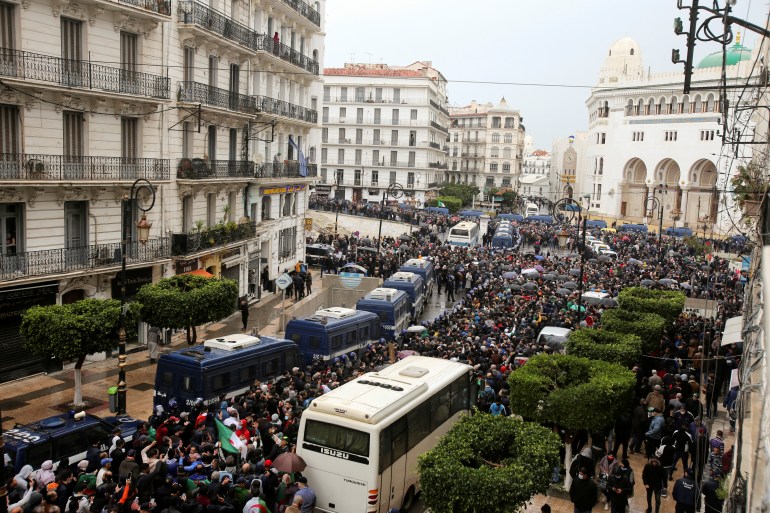Thousands of protesters marched in the Algerian capital and cities across the country to commemorate two years since the beginning of mass protests that culminated weeks later in the departure of longtime President Abdelaziz Bouteflika.

Thousands of protesters marched in the Algerian capital and cities across the country to commemorate two years since the beginning of mass protests that culminated weeks later in the departure of longtime President Abdelaziz Bouteflika.
Demonstrators in central Algiers on Monday chanted slogans against the country’s powerful military and President Abdelmadjid Tebboune as they marched towards the iconic Grand Poste building.
“We are not here to celebrate, we are here to demand your departure,” one placard read.
Security checkpoints created traffic jams across the city, with identity checks carried out around key flashpoints. Several arrests were made.
Police tried to block protesters from gathering around the Grand Poste, the epicentre of protests against Bouteflika.
Elsewhere in the country, marches were being held Monday including in Annaba, Oran, Setif and Mostaganem, according to witnesses and accounts on social media.
Origins of the movement
Tens of thousands of people took to the streets on February 22, 2019, to protest against Bouteflika’s bid for a fifth term in office, despite his failing health.
The octogenarian gave in to public pressure, announcing in early April his decision to step down after 20 years in power.
But demonstrations did not stop. People continued staging rallies on a weekly basis to demand a complete overhaul of the political system.
The military, seen by many as the arbiter of power, resisted popular demands for change, pressing ahead with a presidential election in December 2019, which saw Tebboune elected on a record low voter turnout of just under 40 percent.

Demonstrators in central Algiers chanted slogans against the military and the president [Ramzi Boudina/Reuters]
‘Same old people’
Protesters had only suspended marches last March due to coronavirus restrictions, but calls circulated on social media for a return to the streets from Monday.
On the eve of the anniversary, Tebboune announced a limited government reshuffle, in a bid to head off renewed rallies.
The reshuffle saw few major changes by Tebboune, who was once a prime minister under Bouteflika.
Among those retained are Prime Minister Abdelaziz Djerad and Justice Minister Belkacem Zeghmati, seen as a symbol of Algeria’s judicial crackdown on protesters and opposition activists.
Tebboune also signed a decree dissolving parliament, clearing the way for early elections, for which no date has yet been set.
 Protesters had only suspended marches last March due to coronavirus restrictions, but calls circulated on social media for a return to the streets from Monday [Ramzi Boudinar/Reuters]
Protesters had only suspended marches last March due to coronavirus restrictions, but calls circulated on social media for a return to the streets from Monday [Ramzi Boudinar/Reuters]In a gesture of appeasement on Thursday, Tebboune announced pardons that have led so far to the release of almost 40 pro-democracy activists, including opposition figure Rachid Nekkaz and journalist Khaled Drareni, who has become a symbol of the struggle for a free press.Zaki Hannache, a 33-year-old activist, said Hirak supporters were unimpressed by the president’s reshuffle and his call for early legislative polls.
“The reshuffle doesn’t interest me, it’s the same old people. Same thing with parliament, the new ones [deputies] will work, like the current regime, for their own interests, not for the people,” he said.
Last Tuesday, thousands of Algerians rallied in the northern town of Kherrata, where the first major protest erupted in 2019 against Bouteflika’s bid for a fifth presidential term.


No comments:
Post a Comment
Note: only a member of this blog may post a comment.